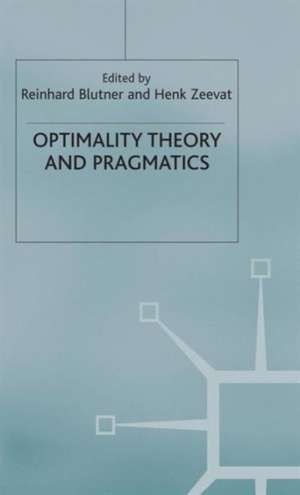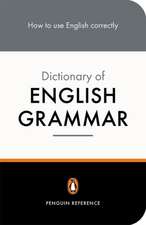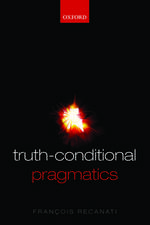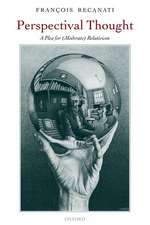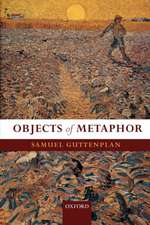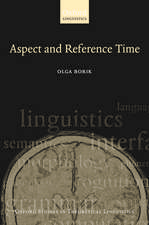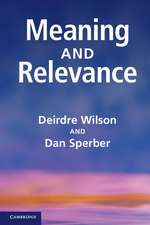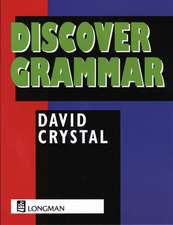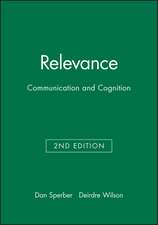Optimality Theory and Pragmatics: Palgrave Studies in Pragmatics, Language and Cognition
Autor Reinhard Blutner Editat de H. Zeevat, Kenneth A. Loparo Autor Anne Bezuidenhout, Richard Breheny, Sam Glucksberg, Francesca Happéen Limba Engleză Hardback – 19 dec 2003
| Toate formatele și edițiile | Preț | Express |
|---|---|---|
| Paperback (1) | 386.22 lei 6-8 săpt. | |
| Palgrave Macmillan UK – 19 dec 2003 | 386.22 lei 6-8 săpt. | |
| Hardback (1) | 391.40 lei 6-8 săpt. | |
| Palgrave Macmillan UK – 19 dec 2003 | 391.40 lei 6-8 săpt. |
Din seria Palgrave Studies in Pragmatics, Language and Cognition
- 20%
 Preț: 755.74 lei
Preț: 755.74 lei - 15%
 Preț: 642.18 lei
Preț: 642.18 lei -
 Preț: 387.75 lei
Preț: 387.75 lei - 15%
 Preț: 641.53 lei
Preț: 641.53 lei -
 Preț: 387.75 lei
Preț: 387.75 lei -
 Preț: 390.63 lei
Preț: 390.63 lei -
 Preț: 386.39 lei
Preț: 386.39 lei -
 Preț: 393.52 lei
Preț: 393.52 lei -
 Preț: 396.40 lei
Preț: 396.40 lei - 15%
 Preț: 641.85 lei
Preț: 641.85 lei -
 Preț: 419.21 lei
Preț: 419.21 lei - 15%
 Preț: 640.88 lei
Preț: 640.88 lei -
 Preț: 385.47 lei
Preț: 385.47 lei -
 Preț: 386.81 lei
Preț: 386.81 lei - 15%
 Preț: 644.30 lei
Preț: 644.30 lei -
 Preț: 422.31 lei
Preț: 422.31 lei - 15%
 Preț: 701.90 lei
Preț: 701.90 lei -
 Preț: 453.39 lei
Preț: 453.39 lei - 18%
 Preț: 946.87 lei
Preț: 946.87 lei - 15%
 Preț: 643.00 lei
Preț: 643.00 lei -
 Preț: 387.58 lei
Preț: 387.58 lei -
 Preț: 394.51 lei
Preț: 394.51 lei -
 Preț: 393.52 lei
Preț: 393.52 lei - 15%
 Preț: 644.18 lei
Preț: 644.18 lei
Preț: 391.40 lei
Nou
Puncte Express: 587
Preț estimativ în valută:
74.90€ • 77.91$ • 61.84£
74.90€ • 77.91$ • 61.84£
Carte tipărită la comandă
Livrare economică 15-29 aprilie
Preluare comenzi: 021 569.72.76
Specificații
ISBN-13: 9781403901293
ISBN-10: 1403901295
Pagini: 320
Ilustrații: XI, 304 p. 2 illus.
Dimensiuni: 140 x 216 x 21 mm
Greutate: 0.49 kg
Ediția:2004
Editura: Palgrave Macmillan UK
Colecția Palgrave Macmillan
Seria Palgrave Studies in Pragmatics, Language and Cognition
Locul publicării:London, United Kingdom
ISBN-10: 1403901295
Pagini: 320
Ilustrații: XI, 304 p. 2 illus.
Dimensiuni: 140 x 216 x 21 mm
Greutate: 0.49 kg
Ediția:2004
Editura: Palgrave Macmillan UK
Colecția Palgrave Macmillan
Seria Palgrave Studies in Pragmatics, Language and Cognition
Locul publicării:London, United Kingdom
Cuprins
Acknowledgements Notes on the Contributors Editors' Introduction: Pragmatics and Optimality Theory; R.Blutner and H.Zeevat On the Interpretation of Stressed Pronouns; H.de Hoop Optimization in Focus Identification; P.Hendriks Optimality Theoretic Pragmatics and Binding Phenomena; J.Mattausch Particles: Pre-supposition Triggers, Context Markers, or Speech Act Markers; H.Zeevat Input-Output Mismatches in Optimality Theory; D.Beaver and H.Lee On the Optimality Theory Status of 'Unambiguous Encoding'; H-M.Gärtner Relevance and Bidirectional Optimality Theory; R.van Rooy Remarks on the Architecture of Optimality Theory Syntax Grammars; R.Vogel Variation in Demonstrative Choice in Swedish; J.Spenader Learning Constraint Subhierarchies: The Bidirectional Gradual Learning Algorithm; G.Jäger References Index
Recenzii
'This collection clearly demonstrates that Optimality Theory finds fruitful applications in the domain of pragmatics. The papers show how to overcome the traditional gap between linguistic meaning and utterance meaning. Conceptions like relevance, conversational implicature, pragmatic anomaly, grammaticalization, recoverability, and constructional iconicity appear in a new light'. - Manfred Krifka, Professor in General Linguistics, Insititute for German Speech and Linguistics, Humboldt University, Germany
'Though the idea of optimization was present in the pragmatic enterprise from the very beginning, we had to wait for this collection in order to see how to integrate pragmatics into Optimality Theory.' - Professor Paul Smolensky, Department of Cognitive Science, Johns Hopkins University
'Though the idea of optimization was present in the pragmatic enterprise from the very beginning, we had to wait for this collection in order to see how to integrate pragmatics into Optimality Theory.' - Professor Paul Smolensky, Department of Cognitive Science, Johns Hopkins University
Notă biografică
DAVID BEAVER Faculty member at the Linguistics Department, Stanford University and Affiliate of the Symbolic Systems Program, USAHELEN DE HOOP Assistant Professor in General Linguistics, University of Nijmegen, The NetherlandsHANS-MARTIN GÄRTNER Assistant Director at ZAS, BerlinPETRA HENDRIKS Assistant Professor at the Departments of Dutch and Artificial Intelligence, University of Groningen, SwedenGERHARD JÄGER Privatdozent, Computational Linguistics Department, Potsdam UniversityHANJUNG LEE Postdoctoral Fellow in the Cognitive Science Program, University of North Carolina, Chapel Hill, USAJASON MATTAUSCH Research Assistant, Zentrum für allgemeine Sprachwissenschaft, BerlinJENNIFER SPENADER Graduate Student, Computational Linguistics, Department of Linguistics, Stockholm UniversityROBERT VAN ROOY is a KNAW-Fellow working on the project Games, Relevance and Meaning at the Department of Philosophy of the University of AmsterdamRALF VOGEL Research Assistant, Institute of Linguistics, University of Potsdam
